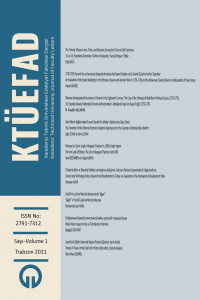15. ve 16. Yüzyıllarda Osmanlılar, Türkler ve Museviler: ‘Kutsal Olmayan” İttifak
Osmanlılar, Türkler, Museviler, Kutsal Olmayan İttifak
The ‘Unholy’ Alliance: Jews, Turks, and Ottomans During the 15th and 16th Centuries
Ottomans, Turks, Jews, Unholy Alliance,
___
- Angel, Marc D., Foundations of Sephardic Spirituality: The Inner Life of Jews of the Ottoman Empire. Woodstock, VT: Jewish Lights Publishing. 2006.
- Baron, Salo W., A Social and Religious History of the Jews: Late Middle Ages and Era of European Expansion 1200-1650 (Vol. 18, The Ottoman Empire, Persia, Ethiopia, India and China). New York: Columbia University Press. 1983.
- Braude, Benjamin, “Myths and Realities of Turkish-Jewish Contacts”, Turkish-Jewish Encounters: Studies on Turkish-Jewish Relations Through the Ages, ed. Mehmet Tütüncü, Haarlem: Stichting SOTA (2001), 15-28.
- Cohen Mark R., “The Jews under Islam: From the Rise of Islam to Sabbatai Zevi: A Bibliographical Essay”, Sephardic Studies in the University, ed. Jane Gerber, London and Toronto: Associated University Press, (1995), 43-119.
- Epstein, Mark A., The Ottoman Jewish Communities and their Role in the Fifteenth and Sixteenth Centuries. Freiburg: Klaus Schwarz Verlag. 1980.
- Epstein, Mark A., “The Leadership of the Ottoman Jews in the Fifteenth and Sixteenth Centuries”, Christians and Jews in the Ottoman Empire: The Functioning of a Plural Society (Volume I, the Central Lands), ed. Benjamin Braude and Bernard Lewis, New York: Holmes & Meier, (1982), 101-116.
- Gerber, H., “Jewish Tax-farmers in the Ottoman Empire in the 16th and 17th Centuries”, Journal of Turkish Studies, 10 (1986), 143-154.
- Gerber, Jane S., Sephardic Studies in the University. London and Toronto: Associated University Press. 1995.
- Goffman, D., “Jews in Early Modern Ottoman Commerce”, Jews, Turks, Ottomans, ed. Avigdor Levy,. New York: Syracuse University Press (2002), 15-34.
- Goldish, M., Jewish Questions: Responsa on Sephardic Life in the Early Modern Period. Princeton and Oxford: Princeton University Press, 2008.
- Güleryüz, N., Türk Yahudileri Tarihi: 20. Yüzyılın başına kadar (History of the Turkish Jews until the beginning of the 20th century). İstanbul: Gözlem Gazetecilik. 1993.
- Hacker, Joseph R., “Ottoman Policy toward the Jews and Jewish Attitudes toward the Ottomans during the Fifteenth Century”, Christians and Jews in the Ottoman Empire: The Functioning of a Plural Society (Volume I, The Central Lands), ed. Benjamin Braude and Bernard Lewis, New York: Holmes & Meier, (1982), 117-126.
- İnalcık, H., “Foundations of Ottoman-Jewish Cooperation”, Jews, Turks, Ottomans, ed. Avigdor Levy, New York: Syracuse University Press (2002), 3-14.
- İnalcık, H., From Empire to Republic: Essays on Ottoman and Turkish Social History, Istanbul: Isis Press. 1995.
- Kohen, E, History of the Byzantine Jews: A Microcosmos in the Thousand Year Empire. Lanham, MD: University Press of America. 2007.
- Levy, A., The Sephardim in the Ottoman Empire. Princeton, NJ: Darwin Press, 1992.
- Levy, A., The Jews of the Ottoman Empire. Princeton, NJ: Darwin Press. 1994.
- Lewis, B., The Jews of Islam. Princeton, NJ: Princeton University Press. 1984.
- Ojalvo, H., Ottoman Sultans and their Jewish Subjects. İstanbul: A Basım. 1999.
- Roth, C., The House of Nasi: Dona Gracia. New York: Greenwood Press. 1969.
- Rozen, M., A History of the Jewish Community in Istanbul: The Formative Years, 1453-1566. Leiden and Boston: E. J. Brill. 2002.
- Schmuelevitz, A, The Jews of the Ottoman Empire in the Late Fifteenth and the Sixteenth Centuries: Administrative, Economic, Legal and Social Relations as Reflected in the Responsa. Leiden: E. J. Brill. 1984.
- Shaw, Stanford J., The Jews of the Ottoman Empire and the Turkish Republic. London: Macmillan, 1991.
- Shaw, Stanford J., History of the Ottoman Empire and Modern Turkey: V. I, Empire of the Gazis, The Rise and Decline of the Ottoman Empire (1200-1808). Cambridge: Cambridge University Press, 1976.
- Toynbee, Arnold J., The Murderous Tyranny of the Turks. London, New York and Toronto: Hodder & Stoughton. 1917.
- Weiker, W., Ottomans, Turks and the Jewish Polity: A History of the Jews of Turkey. Lanham, MD: University Press of America. 1992.
- Başlangıç: 2021
- Yayıncı: Karadeniz Teknik Üniversitesi
Fuzûlî’nin Leylâ ve Mecnûn Mesnevisinde “Ağyar”
15. ve 16. Yüzyıllarda Osmanlılar, Türkler ve Museviler: ‘Kutsal Olmayan” İttifak
Büyük Vatan Savaşı’nın Rus ve Türk Nesrine Yansıması
İdari Reform Bağlamından Osmanlı Devleti’nin Modern Diplomasiye Geçiş Süreci
Sanat Tarihi Eğitimi Alanında Yapılan Tezlerin Eğilimleri: İçerik Analizi
Britanya'nın Demir Leydisi: Margaret Thatcher'ın 1983’e Kadar Yaşamı
